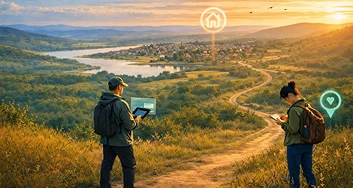Kaisa Kosonen shared Visit Finland's approach to destination transformation. This strategy has a strong focus on digitalisation, with sustainability and data management also becoming increasingly important to combine everything together. The destination transformation process is centred on four key pillars:
- Happiness
- Recovery
- Strategy
- Being Smart
Happiness
For six consecutive years, the United Nations Sustainable Development Solutions Network rated Finland as the happiest country in the world in their World Happiest report. Happiness is all about having a stable society, great governance, legislative independence, gender equality, freedom and trust. Trust is a centrepiece of Finnish society, with people trusting each other and the government. There is support available for everyone and it's easy to be a Finn as there are equal opportunities.
The feeling of happiness is closely connected to nature and is heavily featured in marketing actions. Visit Finland launched the Find your inner Finn campaign to invite international travellers to visit Finland to learn happiness skills. The content has been organically picked up by the media and shared by celebrities, such as the Kardashians.
Happiness links deeply to sustainability and Finland is ranked in first place on an international comparison of Sustainable Development Goals. Finland also have a goal to be carbon neutral by 2035.
Recovery
During the last 3 years, Finland's recovery measures have been focused on three aspects;
- Skills, business and product development
- Brand awareness and sales
- Data Management
Building industry skills around sustainability, digital and data
The Sustainable Travel Finland programme is a seven-step process for companies and destinations to learn about sustainability and taking action.
The Visit Finland DataHub uses open data and is a platform where companies can insert their travel product information. Different digital channels can then utilise the data via an API connection. This helped to solve companies concerns that they lack the time to enter data across multiple channels. Visit Finland started developing the platform before COVID. But the timing of COVID actually gave extra time to enhance the data platform. The DataHub is connected to nearly 2,000 companies and the majority of DMOs. These organisations are curating the information so it is up-to-date and reliable data. There are over 20 different channels that use this information, including the Visit Finland website, Finland Travel Pro (B2B website) and many local and regional DMOs. This makes the Visit Finland DataHub an important part of the digital ecosystem and helps to save time and money. It also helps when launching new marketing campaigns as it is easy to find great content to promote.
Visit Finland have worked on a Digital Toolkit for travel companies about different reservation systems, enabling businesses to understand the types of information needed for each reservation system. They have also developed a guidebook on digital distribution strategies, including key information about different channels and highlighting what works for different companies.
Awareness, brand & sales
Visit Finland relaunched their inspiring B2C website (visitfinland.com) and their B2B website for tour operators and other travel trade professionals. They also restarted their major marketing campaigns after the COVID-19 induced break.
Data
Everyone is talking about the importance of data. Data is a key pillar of Visit Finland's sustainability and digitalisation initiatives as well as for marketing activities. The most significant aspect of Visit Finland's approach to data management was the creation of a National Management by Data Operational Model last year due to the extent of industry pressure towards the NTO. Businesses wanted to share lots of different data through API connections. With limited resources available from individual companies, Visit Finland met with industry stakeholders - including other DMOs, data platforms and local businesses - and planned a model outlining the different roles of the stakeholders with regard to data sharing. This helps the entire Finnish travel ecosystem to understand their individual data management responsibilities. Visit Finland focus on obtaining data at a national level and aim to provide open data for the industry, who can incorporate this information in their own dashboards. Visit Finland also buy some dashboards.
The Sustainable Travel Finland programme is being expanded through the development of an indicator system that looks at the different aspects of sustainability, which is measured at a national, regional and company level. This updated system enables Visit Finland to analyse different characteristics of businesses operating in the country, such as identifying the number of businesses that are offering inclusive products in specific regions or identifying which companies have a year-round product offering and those that are only seasonal. Visit Finland's sustainable development goals include becoming a year-round destination across the whole country. For example, Lapland is a traditional winter destination and there is a desire to attract more tourists in the summer and across shoulder seasons.
Strategy
Visit Finland used the COVID lockdowns to reflect on their core strategies and liaised with the Finnish Ministry of Tourism to create a shared ambition. Sustainability is the main focus of Finland's national tourism strategy and Visit Finland's strategies to create sustainable growth and renewal in Finnish tourism. Finland aims to be the leader of sustainable tourism growth across the Nordic countries.
Visit Finland took a holistic approach to sustainable development, considering the ecological, socio-cultural and economic perspectives. Visit Finland clearly identify the importance of sustainability considering more than just environmental concerns and highlight the need to strive towards a more inclusive industry that secures the vitality of communities and reduces economic inequalities.
Being smart
Visit Finland have achieved a lot, but the process can be made smarter. The digital and sustainable transformations as well as data management has been run in silos. After the large range of destination recovery projects launched in the aftermath of COVID-19, Visit Finland are now focused on becoming more efficient and working smarter as an organisation. This includes the elimination of separate roadmaps for digital, sustainability and data, which will reduce conflict in the workforce between teams where certain topics overlap between different departments. These activities are all part of the same work to improve destinations, the experiences they offer visitors and collaboration between industry stakeholders.
This new organisation structure and cross-functional project-based teams aligns strongly with the UNWTO's definition of smart destinations: "A smart destination is one with a strategy for technology, innovation, sustainability, accessibility and inclusivity along the entire tourism cycle: before, during and after the trip. A smart destination is also one with residents as well as tourists in mind, factoring multilinguism, cultural idiosyncracies and seasonality into tourism planning". Visit Finland's Sustainable Travel Finland programme already takes into account inclusivity, accessibility, resident's needs, tourist's desires and seasonality. Digitalisation and data will support the sustainable development of the industry.
Visit Finland's journey to becoming smarter is focused on working together with other city and regional destinations and companies:
- Facilitating Skills Development: Ensuring DMOs and companies have the correct skillset to keep up with the latest trends and knowledge.
- Launching Pilot Projects: Visit Finland are constantly innovating and for example, have an initiative looking into the applications of Artificial Intelligence in tourism
- Acquiring new data and data analysis: Data analysis software is an important part of Visit Finland's ecosystem.
- Developing the Visit Finland DataHub and Sustainable Travel Finland Hub: All companies registered on these platforms can learn and measure the skills the have built.
- Competitiveness Building: Improving the international competitiveness of Finnish tourism.
Resonance of Sustainability with Visitors
Visit Finland don't measure the importance of sustainability among prospective visitors and use the different reports on consumer attitudes towards sustainability from the main booking platforms.
The Sustainable Travel Finland surveys targeted towards residents and travellers will obtain data about the perceived importance of sustainable travel experiences in the future. However, these attitudes can be implied by measuring the customer satisfaction of travellers.
Factors for success
The Visit Finland DataHub launch was well received and the majority of the leading companies for international travellers are already in the ecosystem. The success of Visit Finland's transformation initiatives can be seen by the high involvement of the local industry.






















.webp)
